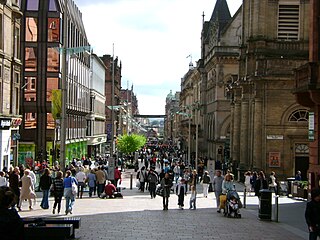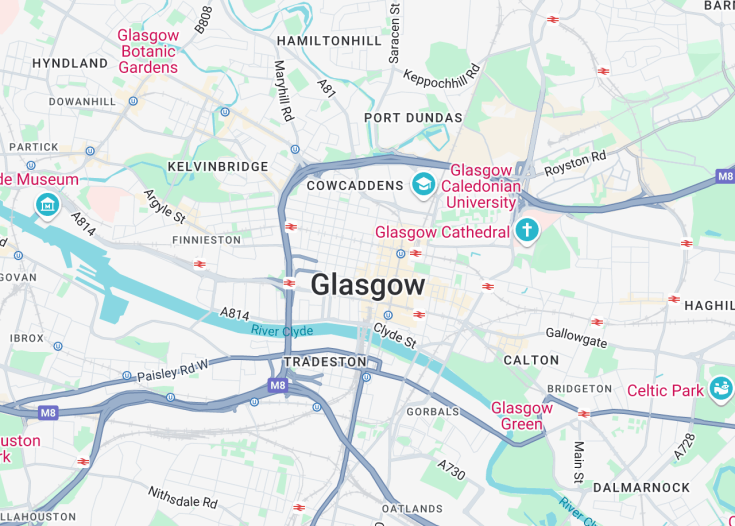Glasgow, Scotland’s largest city, presents a dynamic blend of historic charm and contemporary flair. Renowned for its rich architectural heritage, it harbors Victorian buildings alongside modernist designs. A hub of culture, it boasts world-class museums, art galleries, and a vibrant music scene. Glasgow is also celebrated for its friendly locals, making it a welcoming destination for travelers seeking both history and modernity.
When in Glasgow, don’t miss the opportunity to explore the famous Kelvingrove Art Gallery and Museum. It’s not only free, but also offers an expansive collection of art and historical artifacts.
Plan your visit to coincide with Glasgow’s renowned music festivals or the West End Festival to experience the city in its most vibrant form.
Top things to do & see in Glasgow
Select the following sights and activities to discover best tickets and tours available in Glasgow.
Glasgow: The Vibrant Heart of Scotland
| Country | Scotland (United Kingdom) |
| Time in Glasgow | GMT+0 |
| Language spoken | English |
| Population | 635,640 (source: National Records of Scotland, 2021) |
| Currency | Pound Sterling (£, GBP) |
| Airports |
|
Glasgow, the largest city in Scotland and the third largest in the United Kingdom, pulses with a vibrant energy reflective of its rich history and its modern cultural renaissance. Historically a hub for shipbuilding and marine ventures, Glasgow’s character has been profoundly shaped by its connection to the river Clyde, which facilitated international trade and transport. Today, the city is renowned for its impressive Victorian and art nouveau architecture which was largely funded during its 18th-century economic peak through tobacco, sugar, and cotton trade. Modern Glasgow is a cultural powerhouse known for its dynamic music scene, contemporary art installations, and illustrious museums, such as the Kelvingrove Art Gallery and Museum and the Riverside Museum of Transport and Travel. Additionally, the city is a celebrated educational center, home to several major universities including the prestigious University of Glasgow, established in 1451. Glasgow is also celebrated for its inviting culinary scene, which ranges from traditional Scottish dishes to diverse international cuisine. The city’s hospitality shines in its lively pubs and clubs, where residents and visitors alike revel in the local and live music acts. Amid these urban offerings, Glasgow boasts lush parks and green spaces, earning it the nickname “the Dear Green Place.” With a social consciousness evident in its numerous sustainability initiatives and a commitment to cultural diversity, Glasgow stands as a forward-thinking city with deep historical roots, continually evolving to meet the future. Its warmth and vibrancy make it a must-visit destination, embodying the essence of both historical and contemporary Scottish spirit.
Where is Glasgow?
Glasgow is situated in the western Lowlands of Scotland, straddling the banks of the River Clyde.
Distances:
| Route | Distance by car | Time by car |
|---|---|---|
| Edinburgh to Glasgow | 47 miles (75 km) | 1 hour 10 minutes |
| Inverness to Glasgow | 169 miles (272 km) | 3 hours 20 minutes |
| Aberdeen to Glasgow | 146 miles (235 km) | 2 hours 30 minutes |
What is Glasgow famous for?
Glasgow is acclaimed for its rich architectural heritage, vibrant music and arts scene, and as a former powerhouse of industrial Britain. It’s renowned for its friendly locals, popularly known as ‘Glaswegians’.
History
Prehistoric Times to 550 AD: Early Settlements
While the area of what is now Glasgow has seen human activity since prehistoric times, it was around AD 550 that Saint Mungo founded a religious community which later grew into the city. This period involved small, scattered settlements, largely agrarian and influenced heavily by incoming Romans and later by Christian missions.
550 AD to 1500s: The Medieval Growth
Glasgow began to emerge more prominently in the medieval era. By the 12th century, it was recognized as a notable religious centre, thanks to its cathedral, and started gaining economic power through trade and crafts. The University of Glasgow, established in 1451, is a testament to the city’s growing influence in education and culture during this period.
1500s to 1700s: The Renaissance and Trade Expansion
During the Renaissance, Glasgow continued to expand economically, particularly in trade with the Americas and other parts of Europe. This era was marked by the growth of the tobacco trade, making Glasgow an important economic hub. The city’s architecture began to reflect its prosperity with the construction of grand buildings.
1800s: The Industrial Revolution
The Industrial Revolution transformed Glasgow into one of Britain’s largest cities with industries such as shipbuilding, engineering, and textiles. This period saw a massive population increase, with many people moving to the city for work, dramatically shaping its social and physical landscape.
1900s to Present: Modern Developments
In the 20th century, Glasgow faced the challenges of post-industrial decline, but recent decades have seen a revitalization of the city’s cultural and economic life. Contemporary Glasgow is known for its vibrant arts scene, innovative design, and as a pioneering city for the service sector, maintaining its stature as a significant European city.
Visit Glasgow
What to see and do in Glasgow, Scotland (United Kingdom).
Visitors to Glasgow will discover a city rich in cultural heritage and modern entertainment. Key attractions include the stunning Glasgow Cathedral, the picturesque Glasgow Green, and the Kelvingrove Art Gallery and Museum. Additionally, a tour of the historic University of Glasgow campus is a must. For a taste of local life, explore the vibrant streets of the West End, known for its Victorian architecture and bustling cafes.
Annual Cultural Highlights in Glasgow
Glasgow hosts a variety of events throughout the year, such as the Glasgow International Comedy Festival in March, and the world-renowned Celtic Connections music festival each January. Summer brings the West End Festival, a celebration of cultural and artistic expressions in one of the city’s most charming neighborhoods.
Best time to visit Glasgow
The best times to visit Glasgow are during the late spring and early autumn, particularly from May to September when the weather is mild and the city’s parks are lush and blooming, making it ideal for outdoor activities and events.
is Glasgow worth visiting?
Glasgow is certainly worth visiting for its rich blend of history, culture, and contemporary vibrancy. It offers a unique glimpse into both Scotland’s past and its current cultural evolution. With its world-class museums, vibrant music scene, and historical architecture, alongside friendly locals, Glasgow provides a compelling and enriching travel experience.









